Can Smart Devices Detect Heart Rhythm Abnormalities?
In recent years, technology has transformed the way we monitor heart health. With the rise of smartwatches and mobile health devices, detecting heart rhythm abnormalities has never been more accessible. These devices can offer early warning signs for conditions like atrial fibrillation (AF) and other arrhythmias—potentially life-saving information when followed up with medical care.
Types of Smart Devices That Monitor Heart Rhythm
There are two primary types of wearable devices used to track heart rate and heart rhythm:
1. Photoplethysmography (PPG) Devices
These devices use a light sensor to measure blood flow through the skin, offering a continuous estimate of your heart rate. This technology is commonly found in fitness trackers and smartwatches.
2. ECG (Electrocardiogram) Devices
ECG-enabled devices record the heart’s electrical signals through skin contact points. This allows for a more direct assessment of heart rhythm, making them more accurate for detecting specific arrhythmias like atrial fibrillation.
Heart Rate vs. Heart Rhythm: What's the Difference?
While nearly all devices record heart rate, this data alone is limited. Many factors—including exercise, stress, illness, and stimulants like caffeine—can cause a rise in heart rate, even when the rhythm is completely normal.
A sudden, unexplained spike in heart rate might suggest an abnormal rhythm, but this isn't enough for a diagnosis. True rhythm analysis requires ECG data.
Can These Devices Detect Atrial Fibrillation?
Some advanced smart devices can automatically analyze your heart rhythm and flag irregularities, including possible atrial fibrillation. However, not all devices have this capability, and even those that do may not be 100% accurate.
For devices that record an ECG, there are services available that allow users to send recordings to a third-party medical team for review. These results can often be returned quickly, offering peace of mind or early warning if further action is needed.
Why Specialist Review Is Still Essential
Even if your device flags an abnormal heart rhythm, it’s critical to have the results reviewed by a cardiology or heart rhythm specialist. Devices can sometimes produce false positives or miss subtle abnormalities.
Conditions like atrial fibrillation carry a significantly increased risk of stroke, which can often be prevented with early diagnosis and treatment. That’s why professional evaluation remains the gold standard—even in the age of smart tech.
Conclusion: Use Smart Devices as a First Step, Not the Final Word
Smart heart monitoring devices are powerful tools for increasing awareness and promoting early detection of heart rhythm issues. But they are best used in combination with professional medical care—not as a replacement for it.
If your device shows signs of irregular heartbeat, don’t delay—schedule an appointment with a cardiologist to get a full evaluation and peace of mind.
If you have AF or another arrhythmia, I would be delighted to see you in clinic and give you an expert opinion on your options.


